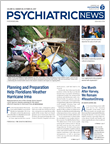Individuals who overindulged in food when sad and/or stressed and then questioned why they did so when they didn’t feel any better may wonder if mood and food are connected.
“There have been many suggestions that dietary patterns are related to depressive symptoms,” but the evidence so far has been mixed, said Marjolein Visser, Ph.D., a professor of health aging in the Health Sciences Department at Vrije Universiteit (VU) in Amsterdam. Visser spoke at a meeting of the International Society for Nutritional Psychiatry Research (ISNPR) in Bethesda, Md.
The studies have probably been too small, which explains their inconsistent results, Felice Jacka, Ph.D., director of the Food and Mood Center at Deakin University in Australia and founder and president of ISNPR, said at the meeting.
In January in BMC Medicine, Jacka published the results of SMILES, a randomized, controlled trial of dietary improvement in 67 adults with major depression. Of these, 55 were being treated with psychotherapy and/or medication therapy. The intervention consisted of seven individual consulting sessions with a clinical dietitian. At the end of the 12-week study, the dietary intervention group demonstrated significantly greater mood improvement compared with baseline, leading the authors to conclude that a healthier diet might represent an efficacious and accessible treatment for managing depression.
Jacka, who has focused on the role of inflammation and oxidative stress, called for more research to identify biological pathways and targets that mediate the association between diet and mental health, although she acknowledged, “getting funding is really hard.”
Could it be that certain dietary patterns are associated with depression because they lead to obesity, which itself is linked to depression? Could changing food-related behaviors and the nutritional status in people with a tendency to be overweight or obese prevent depression?
It makes sense that a cardio-protective diet, such as the Mediterranean diet, could also protect against depression, Almudena Sánchez-Villegas, Ph.D., an associate professor at the University of Las Palmas de Gran Canaria, Spain, said at the meeting. Sánchez-Villegas noted several mechanisms by which such a diet could protect against both heart disease and depression, including an anti-inflammatory effect, a high antioxidant content, improved insulin sensitivity, and reduced risk of metabolic syndrome.
Sánchez-Villegas is an investigator with the SUN study, an ongoing prospective cohort study of Spanish university graduates. In 2015, she and her collaborators reported findings in BMC Medicine about diet and depression in a cohort of 15,000 people.
The researchers had assessed their subjects’ dietary intake at baseline and after 10 years of follow-up. They also looked to see whether the study participants, who were not depressed at baseline, were diagnosed with depression during the follow-up. They observed 1,051 incident cases of depression among the 15,000 participants after a median follow-up of 8.5 years. Cohort members whose eating patterns were rich in fruits and vegetables and whole grains and low in added sugars were less likely to have been diagnosed with depression.
Researchers in a multi-country European project called MooDFOOD—Multi-country cOllaborative project on the rOle of Diet, FOod-related behaviour, and Obesity in the prevention of Depression—hope to determine whether it is feasible and effective to change food and nutrient intake and/or food-related behaviors to protect against depression.
MooDFOOD is analyzing six prospective cohort studies from across Europe to examine the link between food intake, nutrient status, and obesity.
In addition, MooDFOOD is conducting a prevention trial involving 1,000 overweight and obese individuals (those with a body mass index of 25 to 40) who are at risk for depression but not depressed currently or in the year prior to enrollment. People with eating disorders were excluded.
By country, they were randomly divided into four groups: multi-nutrient supplement with food behavioral change (FBC) intervention, supplement with no FBC, placebo pills with FBC, and placebos and no FBC.
They have been taking two supplements or two placebo pills daily. One supplement is a pill containing the omega-2 fatty acids DHA and EPA (the placebo contains sunflower oil), while the other supplement contains minerals and vitamins.
“We took the hardest evidence that there was, and we selected the nutrients based on that,” said Visser, who leads MooDFOOD with VU colleague Ingeborg Brouwer, Ph.D.
As for the FBC intervention, “we’re not telling people ‘You should eat this or that,’ ” Visser said. It will consist of up to 15 individual sessions and up to six group sessions. The intervention includes analyzing each participant’s behavior to determine triggers and unhelpful and helpful food-related behavior.
“The actual food that you eat might be of importance, but I think that other food-related behaviors might be related to depression,” such as not eating mindfully, Visser said. ■
“A Randomised Controlled Trial of Dietary Improvement for Adults With Major Depression (the ‘SMILES’ Trial)” can be accessed
here. “A Longitudinal Analysis of Diet Quality Scores and the Risk of Incident Depression in the SUN Project” is available
here. “The MooDFOOD Project: Prevention of Depression Through Nutritional Strategies” is located
here.

